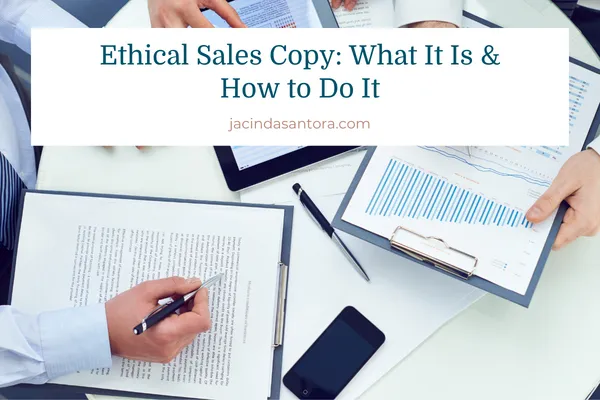



Ethical Sales Copy: What It Is & How to Do It
Ethical sales copy. It might sound like an oxymoron to you, but I’ll hopefully help change that view.
The fact of sales is this: people buy from people and brands they trust.
Without trust, your business is never going to be as successful as it could be.
Of course, building trust takes time, right? That’s why a lot of marketers prefer to use intimidation tactics, some of which make consumers feel uneasy or downright scared about saying “no” to something.
You see it all the time. Marketing that implies or flat out tells you that your life is going to be shitty, depressing, and terrible if you don’t buy this or that product or service.
And I won’t tell you that that kind of marketing isn’t effective. It is.
Companies have made boatloads of money by scaring their customers into buying from them.
But wouldn’t it just feel better if customers chose you because they liked you, trusted you, believed you, and your product delivered on its promises?
I think so.
And that’s why I use ethical sales copywriting (and only work with clients who are willing to do that, too).

Selling isn’t inherently unethical… but the way you do it matters.
As a marketing consultant, I’ve taken course after course about sales and conversion tactics, learning copywriting frameworks that tell a story that will inspire the reader to action.
And one of the most popular and effective copywriting frameworks around starts out with a focus on the consumer’s pain.
And then you’re supposed to agitate that pain.
Sounds dreadful, doesn’t it?
I started seeing it everywhere, too.
Skin care brands that told me I should be ashamed of aging and that their product would save me from my inevitable journey towards the apparent ugliness that comes with age.
Weight loss products that told me my fat body isn’t acceptable and that I couldn’t possibly ever be happy without their product that would save me from my inevitable journey towards the apparent ugliness that comes with being fat.
Even pet food brands that told me I wasn’t a good pet parent and that their product would save my pets from their inevitable journey through a terrible and unhappy life that ends in a horrible death without a different pet food.
Here’s what I started noticing, though.
These brands were trying to reach people outside of their ideal market. And, in the process, they weren’t just making their ideal market feel terrible about themselves, but were trying to make the rest of us feel terrible about ourselves, too.
Those skin care brands could have easily created marketing that appealed to the scores of people who want to age gracefully.
Those weight loss brands could have easily created marketing that appealed to the people who want to lose weight without pushing the narrative that they’re not worthy as people unless they’re thing.
Those pet food brands could highlight the positives that come from feeding my pets their food instead of trying to convince me that I’m a bad pet mom who doesn’t care about her pets’ lives.
In the words of that brilliant philosopher, Taylor Swift, “why you gotta be so mean?”
Especially when you don’t have to be.
The Dos and Don’ts of Ethical Sales Copy
Regardless of whether you use direct response or indirect marketing, you can do it ethically. Here are some dos and don’ts of ethical sales copywriting that will help.
DO Know Your Audience. I will talk about knowing your audience until my dying breath, I’m sure. It’s absolutely vital to know who it is you’re trying to bring into your club. This goes well beyond demographics like age, gender, location, and income. Instead, focus on their interests and behaviors. And, of course, the problems they’re trying to solve.
DO Be Clear In Your Offer. Your offer should be easy to understand and let your target audience know exactly what they can expect from your product or service.
DO Keep Your Pricing Honest. There are several pricing models that you can use. One common tactic is called the “left-digit-deficit” model. Our brains typically focus on the first number in a price, ignoring the rest of it. So, something priced at $997 might feel like you’re just spending $900 instead of $1,000, even though you’re actually spending much closer to $1K. I just changed my pricing because I don’t want to make someone believe something is cheaper than it actually is.
DON’T Underpromise and Overdeliver. Make sure that you can deliver on the promises you’re making in your sales copy. This makes an enormous difference when it comes to building trust and keeping customers happy.
DON’T Use False Urgency and Scarcity. If you’re offering a program with limited space available, by all means let your audience know. If your offer is going away at a certain time, again, let them know. But if your course is evergreen or has unlimited enrollment available, don’t try to make it seem urgent to sign up. Believe me, people will notice if that “limited time only” sale is ALWAYS running.
DO Present Data Accurately. You want your audience to make the choice that’s right for them. The data you use needs to be accurate so they can make that choice. That means keeping your results, testimonials, social proof, and reviews honest.
DO Share Honest Testimonials. Testimonials and other social proof can go a long way towards helping other consumers trust your brand. Be sure to collect them and share them. You can edit them for grammar, length, and spelling, but that’s it. No distorting what the reviewer actually said and please, for the love of everything, no fake reviews.
Related Content: How to Build Ethical Sales Funnels
What can ethical sales copywriting do for your business?
A lot, actually.
If you’re ready to embrace honest, direct, and engaging marketing consultant who's got copy dialed in, let’s talk! I’d love to present your amazing product or service in a way that’s going to attract your ideal audience so you can grow your business (and still sleep soundly at night).
Nothing in on this page or any other site or communication by or from me is a promise of earnings or guarantee of results.
